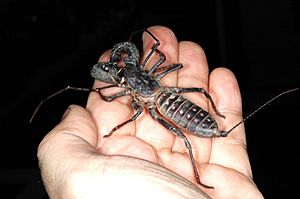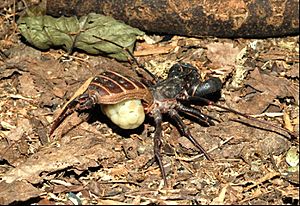Giant whip scorpion facts for kids
Quick facts for kids Giant whip scorpion |
|
|---|---|
 |
|
| Scientific classification |
|
| Kingdom: | Animalia |
| Phylum: | Arthropoda |
| Subphylum: | Chelicerata |
| Class: | Arachnida |
| Order: | Thelyphonida |
| Family: | Thelyphonidae |
| Subfamily: | Mastigoproctinae |
| Genus: | Mastigoproctus |
| Species: |
M. giganteus
|
| Binomial name | |
| Mastigoproctus giganteus (Lucas, 1835)
|
|
| Script error: The function "autoWithCaption" does not exist. | |
| Synonyms | |
|
Thelyphonus giganteus |
|
Script error: No such module "Check for conflicting parameters".
The giant whip scorpion, also known as the giant vinegaroon or grampus, is a fascinating creature. It's a type of whip scorpion that belongs to the family Thelyphonidae. These amazing animals are known for their unique appearance and how they defend themselves.
Contents
What Does It Look Like?
Giant whip scorpions can grow quite large! They can be about 40 to 60 millimeters (about 1.5 to 2.3 inches) long. This measurement doesn't even include their long tail.
They have six legs that they use for walking around. They also have two long front legs that look like antennae. These special legs help them feel their way around and find prey. They can also detect tiny vibrations in the ground.
Another cool feature is their two large pedipalps. These are like strong claws that they use to grab and crush their food. They also have a long, thin tail that looks like a whip. This is how they got the name "whip scorpion."
How Do They Defend Themselves?
When a giant whip scorpion feels threatened, it has a unique defense! From the base of its tail, it can spray a special liquid. This liquid is mostly made of something called acetic acid. Acetic acid is the main ingredient in vinegar. This is why the spray smells strongly of vinegar, and why these creatures are also called "vinegaroons."
Senses and Habitat
Mastigoproctus giganteus has eight eyes. There are two eyes on the front of its head and three on each side. But these eyes are not very good at seeing! So, the giant whip scorpion mostly uses its long front legs, tail, and pedipalps to explore its surroundings. They rely on touch and vibrations to navigate.
These creatures live in the southern parts of the United States and in Mexico.
What Do They Eat?
Giant whip scorpions are very good hunters. They eat many different kinds of insects, worms, and slugs. They especially like to prey on cockroaches and crickets. They also eat millipedes and other arachnids. Sometimes, they even catch and eat small frogs and toads!
They use their big pedipalps to hold their prey tightly. Then, they use their mouthparts, called chelicerae, to tear and bite their food.
As Pets
Some people find these unique animals interesting and keep them as pets.
Images for kids
See also
 In Spanish: Alacrán látigo para niños
In Spanish: Alacrán látigo para niños
 | Delilah Pierce |
 | Gordon Parks |
 | Augusta Savage |
 | Charles Ethan Porter |



